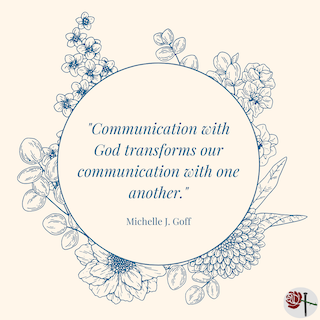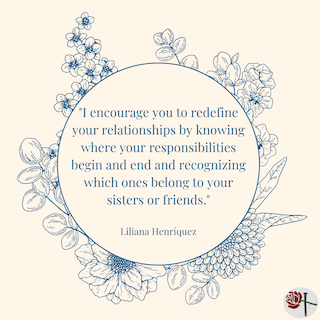Blog Article Tags
We love building relationships. Subscribe to our blog to receive weekly encouragement in your email inbox.
Search Blog Posts
- Details
 Written by Michelle J. Goff
Written by Michelle J. Goff
For relationships to work, we must work at them. Friendships develop over time and through shared experiences.
Roommates will tell you that clear communication is important. Expectations have to be expressed and explained, then either dismissed, adjusted, or met. Who is going to take out the trash? Do we share meals or do our own? Are you a morning person or a night owl?
For a season, my parents taught a premarital class on first-year adjustments. The blending of two families is not a trivial undertaking. They asked key questions and told funny anecdotes in order to walk the couple through some of the preparation that it takes to make these first-year adjustments. The answers to some questions may appear obvious to one, but the other has a very different way of looking at things. Respectful love and open communication are necessary building blocks for a solid marriage.
Forty-five years later, my parents would tell you respectful love and open communication are still key elements that cannot be ignored. I echo the sentiment of their necessity even though, for me, that has not been evidenced directly through marriage, but rather as foundational factors in the building of all relationships.
Respectful love is not eros love, the romantic type of love that can be fleeting and emotion based. Respectful love is rooted in fileo (brotherly) and agape (unconditional) love, as we find most described in the Bible. First Corinthians 13, for example, presents a love that is not self-seeking. It keeps no record of wrongs.
Love is patient and kind; love does not envy or boast; it is not arrogant or rude. It does not insist on its own way; it is not irritable or resentful; it does not rejoice at wrongdoing, but rejoices with the truth. Love bears all things, believes all things, hopes all things, endures all things.Love never ends.
I don’t know about you, but that type of love seems nearly impossible, unattainable by my own efforts. I can be admittedly selfish. I am least patient with myself, but also impatient with others. My desire to not be taken advantage of leads me to keep a record of wrongs and occasionally be resentful.
In my mind, I know that no matter the type of relationship, if I want it to develop and deepen, it must be grounded in a love that respects the other person, considers his or her needs above our own, and endures.
How do I resolve the distance between the biblical description of love as found in 1 Corinthians 13 and the fallible version of love found in most relationships?
God. Since God is love, I step back and allow Him to define the relationship. Have you thought about having a DTR talk with God? DTR: Define the Relationship.
Because the other way in which we can work toward attaining that kind of love in our relationships is through communication—with God and with the other person.
Not to sound cliché, but sincere, open communication with God through prayer will guide us in redefining our relationships. Communication with God transforms our communication with one another. A foundational relationship with God lays the groundwork for our relationships with others.
Take a moment today to reflect on two relationships you want to see grow. Pray about those two people by name. Ask God to guide your communication. Invite Him, as Love defined, into your conversations and interactions.
- Details
 Written by Liliana Henríquez, volunteer with Iron Rose Sister Ministriesin Colombia
Written by Liliana Henríquez, volunteer with Iron Rose Sister Ministriesin Colombia
Where do you begin and where do I begin?
Why does it sometimes seem as if we become one person instead of being two separate individuals?
Have you ever wondered this?
Sometimes my tastes merge with your tastes and my problems become your problems.
However, it is important to know our boundaries and not assume responsibilities that are not ours to begin with.
When we understand that each of us has our own responsibilities to fulfill, we will stop seeing what happens in our neighbor's house and instead, focus on what happens in ours. It's about acknowledging what God gave us and doing the best you can with it. As we see in the parable of the talents in Matthew 25:14-30, the task was simple: each one would be in charge of multiplying the talents he received. The task was not to see how many talents the friend got and do the work for him. Each one of them had to fulfill their own responsibilities.
I have come to understand that, just like me, the people around me have internal and external resources to face the situations of daily life. Nobody needs to be carried like a baby. We, as adults, have the potential to use the resources available to us. In addition, we count on the extraordinary help of the Holy Spirit to guide us at all times and intercede for us before God when we do not even know what to ask for (Rom. 8:26).
Okay then, if I know that you are capable of taking care of yourself, why is it difficult for me not to get so involved in your life?
Because I am not sure what my boundaries are!
When this happens, out of a motivation to keep up appearances, we get involved in situations in which we have not been called, we give opinions that we have not been asked for, and we accept tasks that we do not really want to do.
I encourage you to redefine your relationships by knowing where your responsibilities begin and end and by recognizing which ones belong to your sisters or friends. If each of us guards our own heart and takes care of ourselves, we will have more pleasant and easy-going friendships. After all, no one likes to carry other people's problems! While we may be willing to help, we should always have the discipline to establish boundaries, so that we don’t allow those we love to grow dependent on us but rather allow them to gain strength and experience through their trials. By establishing our boundaries, we do not become involved in an unhealthy way.
It’s one thing to help and support each other. We have been called to love one another, but to assume other people's responsibilities is a very different thing.
It is time to clearly define the terms of our relationships and establish healthy boundaries.
